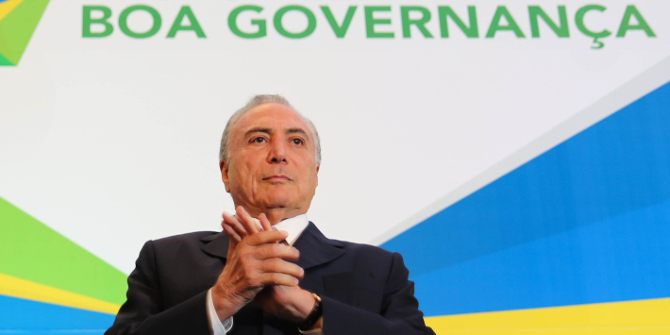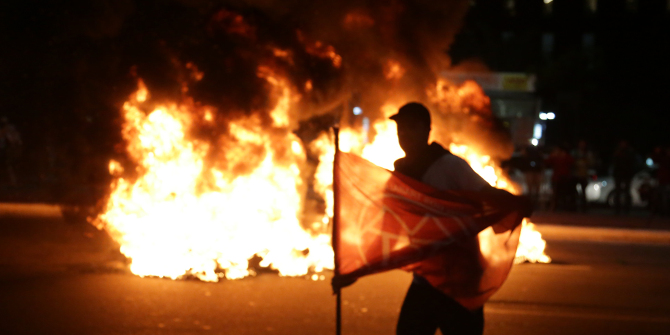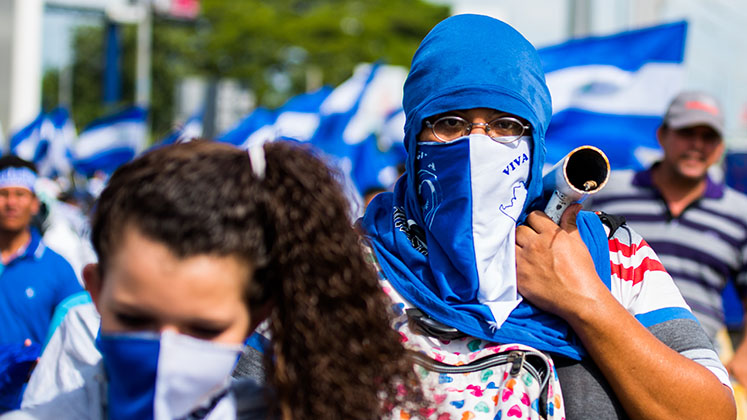 A coordinated political effort to move toward higher labour productivity, higher valued-added activities, and a solid foundation of public education and health services can only be achieved through elections and negotiations between legitimate representatives, writes Mark S. Langevin.
A coordinated political effort to move toward higher labour productivity, higher valued-added activities, and a solid foundation of public education and health services can only be achieved through elections and negotiations between legitimate representatives, writes Mark S. Langevin.
Brazil’s compounding crisis swirls the Lava Jato corruption scandal with a devastating recession to create a toxic political mix that has paralysed the country. Poverty and unemployment haunt the many millions in Brazil who remember the boom but can only hope to survive the bust. Windows of opportunity are closing as Brazilians survey the ruins left behind by Lava Jato, fiscal and exchange-rate populism, and bad governance. The government of President Michel Temer, architect of his predecessor Dilma Rousseff’s impeachment last year, fights on without popular support amidst a whirlwind of corruption allegations. The economy limps along without any prospect of significant increases in consumer demand or productive investment for the foreseeable future.
For now Brazilians await the 2018 elections with caution and recognize that the crisis is well beyond the reach of any charismatic, well-intentioned “Saviour of the Fatherland”. Instead, political and economic reforms are needed to sail towards a sustainable recovery, but is the Temer government in a position to provide them?

The sources of the crisis
The first signs of Brazil’s compounding crisis emerged in June 2013 with sizeable marches and demonstrations involving the “free bus pass” movement. As they spread across Brazil’s major cities, they soon evolved into anti-corruption and anti-government protests.
The mobilisations quickly “flipped” Dilma Rousseff from being a popular president to one scrambling for a new political recipe, which ultimately consisted of five key ingredients:
- greater fiscal responsibility
- investment of all pre-salt petroleum royalties in education
- provision of foreign doctors to satisfy growing demand for medical services in Brazil’s poorest regions
- calling of a constituent assembly to reform the political system and achieve greater accountability
- increased investment in public transport (as demanded in the original 2013 mobilisations)
The constituent-assembly proposal and subsequent plebiscite aimed to reform campaign finance, end secret votes by congress, and create congressional districts to hold Federal Deputies to a higher degree of accountability. But the idea was mistrusted by protesters, rejected by congress, neglected by her own party, and left to melt away amidst the political polarisation surrounding the 2014 presidential and congressional elections and the Lava Jato investigations and prosecutions. This may have been the moment to fix Brazil, but the prevailing winds of change swept away any possibility of compromise and reform.
Presidential and congressional job approval
Four years later reform is dead in the water, with little hope of holding congress accountable after two-thirds of its members voted to oust Dilma in 2016. President Temer’s job approval rating is at an historic low with only seven percent of Brazilians finding that his administration is good or very good. Temer has also been indicted by the Attorney General Rodrigo Janot and will face a vote in the lower House of Deputies on whether to initiate proceedings for his removal.
But the Brazilian Congress itself is under suspicion. Forty-four current and former Federal Deputies and Senadors have been indicted by the Lava Jato prosecutions, while there are 238 Brazilian congressional representatives from the largest political parties that have criminal, electoral, or corruption charges pending in the Supreme Court. The former President of the House of Deputies, Eduardo Cunha (of Temer’s PMDB party), is now behind bars for his participation in the Lava Jato scheme. Understandably, few Brazilians trust congress to do the right thing, and many conclude that the legislative branch is protecting itself from criminal investigations.
The compounding crisis and plummeting approval for the executive and legislative branches of government call into question the legitimacy of policymaking in Brasilia. Yet, the existence of a vocal “Fora Temer” movement has not stopped the president and congress from passing several economic reforms that some argue are essential for recovery. These reforms are both symbolic and substantial, being targeted to please investors and rating agencies.
They include the passage of a constitutional amendment that caps federal spending, a labour reform that reduces workers’ protections and weakens labour unions, new airline regulations that permit checked-baggage charges, and a tax rise on gasoline, all in the name of fiscal stability and economic recovery. Temer is also pushing for a new law that would open up large tracts of the Jamanxim national forest reserve to the private sector.
Overall, the reforms serve to reduce the size of the state and promote an economic strategy orientated towards the market and a model of global integration based on agricultural and low value-added industrial exports, placing Brazil on the lowest rungs of global value chains. This agenda might make Brazil more competitive, but it will do little to increase the productivity of most Brazilians.

Failing to reform to recover
Temer’s reform agenda is ad hoc and his government features few supporters of public education and health services, environmental protection, or reindustrialisation. Instead, Temer’s strategy appears to focus on his own political survival and is characterised by large-scale logrolling (vote trading) in order to preserve a majority capable of passing some reforms and protecting him from impeachment.
From this perspective, a willingness to section off the Jamanxim forest reserve can be seen as a means of securing votes from the agribusiness caucus so as to guarantee his survival. On the flip side, a gasoline tax hike reassures Wall Street that the government’s revenue targets will be met, even though the measure will likely slow recovery. If one could criticise the Dilma government for economic-policy volatility, the same must be said of Temer.
Clearly, Temer has tried to do more for business interests than his predecessor, but it is uncertain whether his mix of reforms and logrolling can drive an economic recovery. According to the OECD’s June 2017 economic forecast for Brazil:
“The economy is finally emerging from a severe and protracted recession. Still, the recovery is projected to be weak and slow. Consumer and business confidence is rising and agricultural exports started the year on a strong footing. However, unemployment is projected to decline only towards the end of this year, and then to fall only gradually. Inflation has decreased significantly, partly due to lower demand, and is projected to close the year below the 4.5% inflation target. Inequality remains high.”
The question is whether this tentative recovery will lead to greater consumer demand, investment and productivity. Wages and unemployment are expected to lag, creating a drag on the economic recovery that investors are waiting for. Currently the unemployment rate is 13.3 percent with some 13.8 million idle workers. Temer and advocates of his labour reform argue that greater labour-market flexibility generates employment, but they also agree that such an effect takes years to achieve.
In the short term, Brazilian workers will earn less and have fewer employment opportunities. These outcomes have pulled down inflation, triggering interest rate decreases, but they also prevent a full economic recovery. Fiscal stability and economic recovery demand an active employment policy, but for now the only job Temer is worried about is his own.
Neither is foreign investment picking up the slack. Santander Trade Portal notes that:
“Foreign direct investment (FDI) into Brazil boomed over the period 2009-2011, but has been slowing down ever since. After reaching USD 73 billion in 2014, FDI inflows to Brazil declined to USD 64 billion in 2015. The flows continued to decline in 2016, reaching USD 58 billion.”
Brazilian assets are cheap so medium- to long-term investors are willing to take the plunge, but many foreign investors remain cautious about opportunities created by the recession. At this juncture, Temer and his allies lack the legitimacy to negotiate the passage of coherent reforms that would achieve greater political accountability, address the fiscal crisis, and build a sustainable foundation for economic recovery. Instead, the government is managing an incoherent reform agenda while defending the president against the Attorney General’s charges and mounting discontent within his own coalition. Foreign investors cannot bail out the president or his majority in congress.
Temer’s political survival and his peculiar mix of economic and fiscal policy reforms cannot repair Brazil or lead to a sustainable economic recovery. Global demand for Brazilian exports may drive greater investment and employment, but a coordinated political effort to move toward higher labour productivity, higher valued-added activities, and a solid foundation of public education and health services can only be achieved through elections and negotiations between legitimate representatives.
For now Brazil is stuck in the mud, and its people will have to wait for new elections to lift them out of it.
Notes:
• The views expressed here are of the authors and do not reflect the position of the Centre or of the LSE
• Please read our Comments Policy before commenting
 Mark S. Langevin – Elliott School of International Affairs, George Washington University
Mark S. Langevin – Elliott School of International Affairs, George Washington University
Mark S. Langevin, Ph.D, is Director of the Brazil Initiative and Research Professor at the Elliott School of International Affairs-The George Washington University, Director of BrazilWorks, and Member of the International Council of the Centro Brasileiro de Relações Internacionais (CEBRI). He can be contacted at: langevin@gwu.edu





